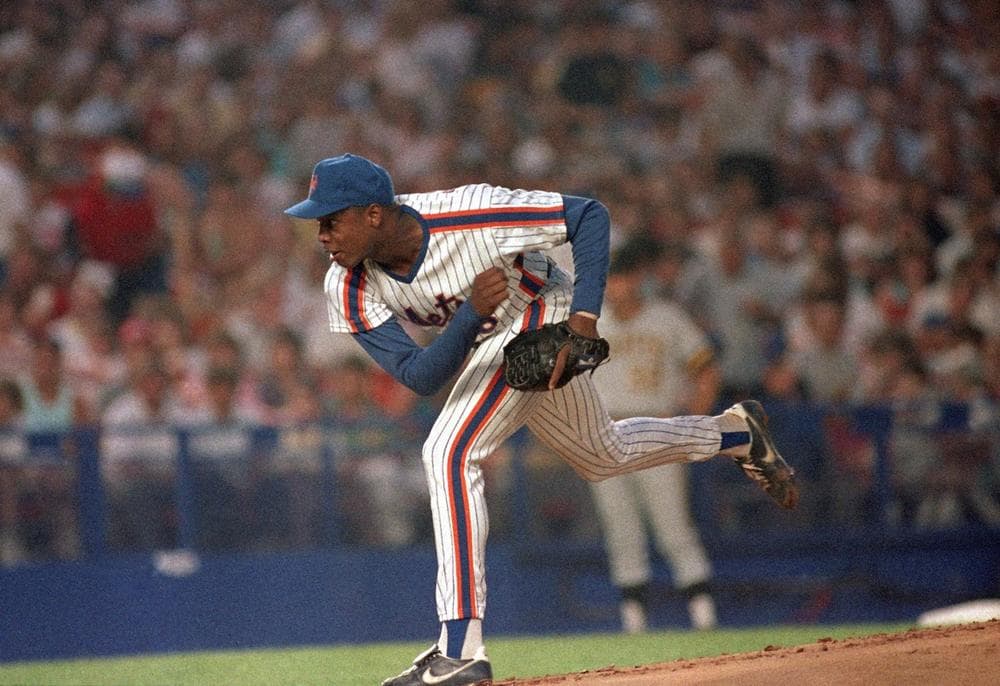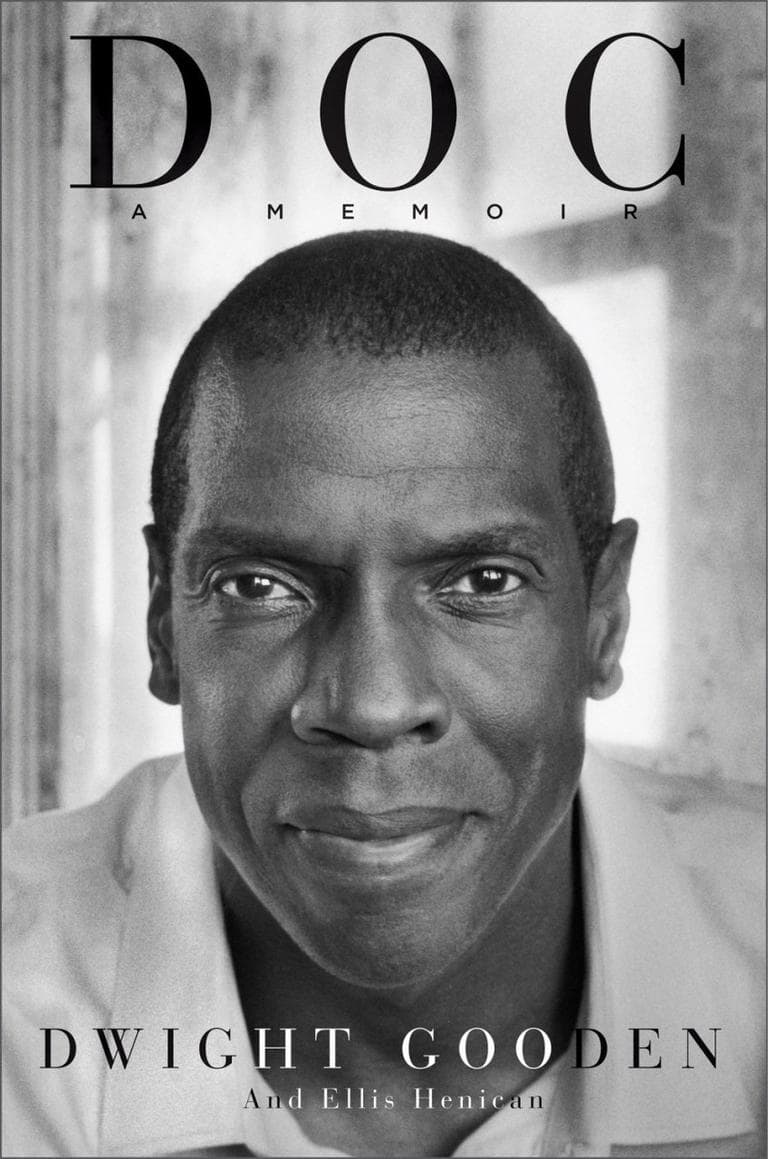Advertisement
Featured Book
Dwight Gooden Looks Back On Highs And Lows In 'Doc'

Doc: A Memoir is a tough read. With Newsday columnist Ellis Henican, Dwight "Doc" Gooden has produced a chronicle of his decades-long struggle against self-destruction via drug and alcohol addiction. Gooden, a former Cy Young Award winner and MVP, is sober today. Gooden joined Bill Littlefield.
Highlights From Bill's Conversation With Dwight "Doc" Gooden
BL: Dwight, Doc begins with your failure to join your teammates in celebration after the New York Mets had won the 1986 World Series, but tell us about where you were the day of that celebratory parade and the night before it.
DG: What should have been the highlight of my baseball career at that point. Unfortunately three hours after clinching the World Series and celebrating with my teammates, I found myself in housing projects in Long Island partying all night drinking, drugging through the wee hours of the night. My goal was to get a little bit of drugs and go back and join my teammates at a local bar. Obviously, I never made it out of that apartment. And I saw the sun come up and, watching when the parade started on TV, that's basically what sobered me up. And that's when all the shame and the guilt and embarassment came in and every negative thought that you could imagine going through my head. I spent the rest of that day, when I finally got the courage to drive home, in my apartment with the drapes closed, the shades pulled, and basically just by myself just sobbing all day.
BL: You were 19 years old when you joined the previously disappointing Mets back in 1984, and as it says in the book, "a whole lot of Mets fans thought the savior might be me." For a time, you pitched as if you could be that savior. From '84 to '86, you won 58 games and lost only 19. You led the league in strikeouts twice and in ERA once. I wonder if at that point you felt, "Hey, this is easy."
DW: I didn't feel like it was easy, but I'll tell you what, I felt like I could be successful for a long time. I took a lot of pride in my work between starts and my preparation that I would go through with my pitching coach Mel Stottlemyre as well as my dad in Tampa. It was a situation where I felt like, more so in '85 -- or after the All-Star break in '84 where I felt like I truly belonged — but in '85 it was a situation where it almost felt like it was a concert and I was the main event and everybody was there to see me. Unfortunately the following year in '86, a lot of expectations from the media, myself, the organization — it just got to the point where it just became too much. And that's when the drugs and the alcohol became very, very demanding and useful where I was basically medicating myself.
BL: Regarding cocaine, you write in the book, "it was love at first sniff." Tell us a little bit about how and where you began using the drug.
DG: I had a cousin that basically was a drug dealer, and he also had women that worked for him on the street. I was at his place I was basically there to pick up some marijuana, and he said he had to go get it. He was all out. As he left the house to go get it, I told him, "I'll wait here." It was two young ladies in one of the rooms at his place, barely dressed and was doing cocaine and drinking, and they asked me to come join 'em. I said, "No, I'd rather not" because at that time I couldn't imagine doing anything worse than marijuana even though a drug is a drug. But ended up doing it. Women was one of my weaknesses as well. So eventually I went in the room where they were, we struck up a conversation. Eventually they convinced me into doing a couple lines. I had a couple drinks. I tried it just to see what it was like and unfortunately it gave me a feeling like I'd never felt before. It was a false feeling where I thought this is the way I always wanted to feel. And the rest was history.
BL: Dwight, I remember speaking with you in the visitors' locker room at Fenway Park in '98 or '99. You were pitching for Cleveland Indians at the time, and you said all the right things: every day was a gift, you felt fortunate to be alive, let alone to be in the Major Leagues stills. Were you fooling people like me in those days or were you fooling yourself as well?
DG: I was fooling myself, but at the time I said those things that's where I was. It was a gift, and I was feeling great. Unfortunately, my track record has been once I get the clean time in, I'll start cutting back on things that I was supposed to do. Those things are basically my tretment. Like if you had cancer you get chemo. Having a disease of drugs and alcohol, my treatment is the sponsors, the meetings, the support groups. I always start cutting back on that, and when I start cutting on that it's just a matter of time before I'm gonna relapse. And it happened so many times that it unforunately took a lot of beatings to me and self-destruction that now I have to accept that as part of my life, and that's just the way it is on a daily basis.
BL: According to the book, you didn't embrace sobriety until 2011. Why were you able to take advantage of participation on the TV program Celebrity Rehab when you hadn't allowed all those previous rehab programs to work?
DG: I think the thing that really helped me was removing that mask from myself and being honest with myself and coming clean with myself. It meant that I am an addict, I'm just not an active addict. And I do have this disease of alcohol and drugs and I think being on TV allowed me to basically tell my story and come clean because in my sick thinking, even though my track record says I am a full-blown addict and alcoholic, I still had denial where I still didn't want to come out and admit that. I didn't want to admit that to myself, so I definitely didn't want to admit it to others. At the time I was ready, truly ready to surrender to this disease gave me an opportunity and gave me a stage where I could admit to the world that this is who I am and this is who I am going to be the rest of my life, but hopefully I'm not going to be active in addiction.
With the assistance of Ellis Henican, a columnist at Newsday, Dwight "Doc" Gooden has told the story of his life.
It's significant that the book doesn't begin with Gooden's first major league win in 1984. Instead Doc begins with the description of how Gooden missed the parade staged for the Mets after they'd won the World Series in 1986. Instead of rolling down Broadway in the company of his celebrating teammates, Gooden was huddled in his bedroom, sick from a late night and early morning of throwing back vodka shots and snorting cocaine, afraid to answer the telephone.
Gooden and Henican don't ignore baseball. The book includes the highlights of Gooden's career: winning the Rookie of the Year and the Cy Young Awards with the Mets, and throwing a no-hitter for the Yankees. But the emphasis is on Gooden's drug and alcohol addictions, his failure to honestly confront them despite myriad opportunities over two decades to do so, and his eventual work, beginning in 2011, to achieve lasting sobriety.
Lots of baseball biographies and autobiographies have been advertised as "tell-all" books. Doc tells so much that it is sometimes hard to read. But the tell-all here isn't gossip. The book feels like what 12-Step Programs characterize as "taking inventory." Gooden sounds as if he's discovered that acknowledging what he has done and making amends to those he has hurt and disappointed is crucial to maintaining the equilibrium he says he's finally managed to achieve.
I remember a conversation I had with Dwight Gooden almost 15 years ago, when he was pitching for Cleveland. Just a couple of years earlier he'd been suspended for an entire season after his umpteenth failed drug test. On that day in the visitors' clubhouse at Fenway Park, Gooden said all the right things. He told me he learned to regard every day as a gift. I wanted to believe him then, and I told him I was rooting for him. Having read Doc, I'm rooting for him again.
This segment aired on June 8, 2013.

